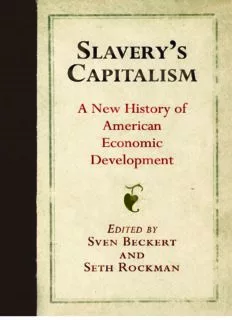Table Of ContentSlavery’s Capitalism
This content downloaded from 146.95.253.17 on Sat, 07 Oct 2017 17:51:35 UTC
All use subject to http://about.jstor.org/terms
EARLY AMERICAN STUDIES
Series editors:
Daniel K. Richter, Kathleen M. Brown,
Max Cavitch, and David Waldstreicher
Exploring neglected aspects of our colonial, revolutionary, and early national
history and culture, Early American Studies reinterprets familiar themes and
events in fresh ways. Interdisciplinary in character, and with a special emphasis
on the period from about 1600 to 1850, the series is published in partnership
with the McNeil Center for Early American Studies.
A complete list of books in the series is available from the publisher.
This content downloaded from 146.95.253.17 on Sat, 07 Oct 2017 17:51:35 UTC
All use subject to http://about.jstor.org/terms
SL AV ERY ’S
C A PITA LISM
A New History of American Economic Development
Edited by
Sven Beckert
and
Seth Rockman
University of Pennsylvania Press
Philadelphia
This content downloaded from 146.95.253.17 on Sat, 07 Oct 2017 17:51:35 UTC
All use subject to http://about.jstor.org/terms
Copyright © 2016 University of Pennsylvania Press
All rights reserved. Except for brief quotations used for
purposes of review or scholarly citation, none of this book
may be reproduced in any form by any means without
written permission from the publisher.
Published by
University of Pennsylvania Press
Philadelphia, Pennsylvania 19104-4112
www . upenn . edu / pennpress
Printed in the United States of Amer i ca on acid- free paper
10 9 8 7 6 5 4 3 2 1
A catalogue record for this book is available from the
Library of Congress.
ISBN 978-0-8122-4841-8
This content downloaded from 146.95.253.17 on Sat, 07 Oct 2017 17:51:35 UTC
All use subject to http://about.jstor.org/terms
To Ruth J. Simmons, President of Brown University, 2001–2012
This content downloaded from 146.95.253.17 on Sat, 07 Oct 2017 17:51:35 UTC
All use subject to http://about.jstor.org/terms
This content downloaded from 146.95.253.17 on Sat, 07 Oct 2017 17:51:35 UTC
All use subject to http://about.jstor.org/terms
Contents
Introduction. Slavery’s Capitalism 1
Sven Beckert and Seth Rockman
PART I. PLANTATION TECHNOLOGIES 29
Chapter 1. Toward a Po liti cal Economy of Slave Labor:
Hands, Whipping- Machines, and Modern Power 31
Edward E. Baptist
Chapter 2. Slavery’s Scientifi c Management: Masters
and Man ag ers 62
Caitlin Rosenthal
Chapter 3. An International Harvest: Th e Second Slavery,
the Virginia- Brazil Connection, and the Development
of the McCormick Reaper 87
Daniel B. Rood
PART II. SLAVERY AND FINANCE 105
Chapter 4. Neighbor- to- Neighbor Capitalism:
Local Credit Networks and the Mortgaging of Slaves 107
Bonnie Martin
Chapter 5. Th e Contours of Cotton Capitalism: Speculation,
Slavery, and Economic Panic in Mississippi, 1832–1841 122
Joshua D. Rothman
Chapter 6. “Broad is de Road dat Leads ter Death”:
Human Capital and Enslaved Mortality 146
Daina Ramey Berry
This content downloaded from 146.95.253.17 on Sat, 07 Oct 2017 17:52:00 UTC
All use subject to http://about.jstor.org/terms
viii Contents
Chapter 7. August Belmont and the World the Slaves Made 163
Kathryn Boodry
PART III. NETWORKS OF INTEREST AND THE NORTH 179
Chapter 8. “What have we to do with slavery?”
New En glanders and the Slave Economies of the West Indies 181
Eric Kimball
Chapter 9. “No country but their counting- houses”:
Th e U.S.- Cuba- Baltic Cir cuit, 1809–1812 195
Stephen Chambers
Chapter 10. Th e Coastwise Slave Trade and a Mercantile
Community of Interest 209
Calvin Schermerhorn
PART IV. NATIONAL INSTITUTIONS AND
NATU RAL BOUND ARIES 225
Chapter 11. War and Priests: Catholic Colleges and Slavery
in the Age of Revolution 227
Craig Steven Wilder
Chapter 12. Capitalism, Slavery, and the New Epoch:
Mathew Carey’s 1819 243
Andrew Shankman
Chapter 13. Th e Market, Utility, and Slavery in Southern
Legal Th ought 262
Alfred L. Brophy
Chapter 14. Why Did Northerners Oppose the Expansion of Slavery?
Economic Development and Education in the Limestone South 277
John Majewski
Notes 299
Contributors 385
Index 389
Acknowl edgments 405
This content downloaded from 146.95.253.17 on Sat, 07 Oct 2017 17:52:00 UTC
All use subject to http://about.jstor.org/terms
Introduction
Slavery’s Capitalism
Sven Beckert and Seth Rockman
During the eighty years between the American Revolution and the Civil
War, slavery was indispensable to the economic development of the United
States. Such a claim is at once self- evidently true and empirically obscure.
A scholarly revolution over the past two de cades, which brought mainstream
historical accounts into line with long- standing positions in Africana and
Black Studies, has recognized slavery as the foundational American institu-
tion, organi zing the nation’s politics, legal structures, and cultural practices
with remarkable power to determine the life chances of those moving through
society as black or white. An outpouring of scholarship on nineteenth- century
public health, criminal justice, foreign policy, popu lar culture, and patterns
of everyday life leaves little doubt that the new United States was a “slavehold-
ing republic.”1 In comparison, only a small segment of recent scholarship has
grappled with the economic impact of slavery. Only in the past several years
has scholarship on fi nance, accounting, management, and technology allowed
us to understand American economic development as “slavery’s capitalism.”
And only now is there enough momentum to leverage some basic facts— that
slave- grown cotton was the most valuable export made in Amer i ca, that the
capital stored in slaves exceeded the combined value of all the nation’s rail-
roads and factories, that foreign investment underwrote the expansion of plan-
tation lands in Louisiana and Mississippi, that the highest concentration of
steam power in the United States was to be found along the Mississippi rather
This content downloaded from 146.95.253.17 on Sat, 07 Oct 2017 17:52:08 UTC
All use subject to http://about.jstor.org/terms
Description:During the nineteenth century, the United States entered the ranks of the world's most advanced and dynamic economies. At the same time, the nation sustained an expansive and brutal system of human bondage. This was no mere coincidence. Slavery's Capitalism argues for slavery's centrality to the eme

